
Article
November 8, 2021
UNC Celebrates First-Generation Students
The University of Northern Colorado is proud to join the fifth annual First-Generation College Celebration on Nov. 8. The event, launched in 2017 by the Council for Opportunity in Education (COE) and the Center for First-generation Student Success, is designed to celebrate the outstanding accomplishments of first-generation students, faculty, staff and alumni.
The University of Northern Colorado is proud to join the fifth annual First-Generation College Celebration on Nov. 8. The event, launched in 2017 by the Council for Opportunity in Education (COE) and the Center for First-generation Student Success, is designed to celebrate the outstanding accomplishments of first-generation students, faculty, staff and alumni. According to the COE, the date marks the 56th anniversary of the signing of the Higher Education Act in 1965, which helped millions of first-generation students persist to degree completion.
As more than 40% of UNC’s undergraduates are the first in their family to go to college, serving this population is an integral part of our commitment to being a Students First university.
“First-generation students are a vital part of the UNC community. They bring many gifts to college such as problem-solving skills, a strong drive for reaching their goals and resourcefulness,” said Stephanie Torrez, UNC’s assistant vice president for Student Success. “First-generation student success is the heart of my 25+ year career. My first professional experiences were working for TRiO programs like Talent Search and Student Support Services. I’m so happy to see UNC join the celebrations.”
According to the U.S. Department of Education, TRiO programs are federally funded programs designed to identify and provide services to assist first-generation college students, low-income individuals and individuals with disabilities, to progress through the academic pipeline from middle school to post-baccalaureate programs. UNC is the awardee of three TRiO programs that prioritize first-generation students in their program eligibility, including Upward Bound, Student Support Services and the Ronald McNair Scholar’s program. Funding is competitive and awardees must demonstrate not only a need for the program, but also have a competitive plan of operation to meet identified objectives. Read more about some of the other programs UNC offers that help support first-generation students, including special scholarships and mentoring programs that focus on promoting student success.
Join us as we recognize and celebrate the stories of some of UNC’s first-generation community members.
First-Generation Siblings Forging Ahead Together
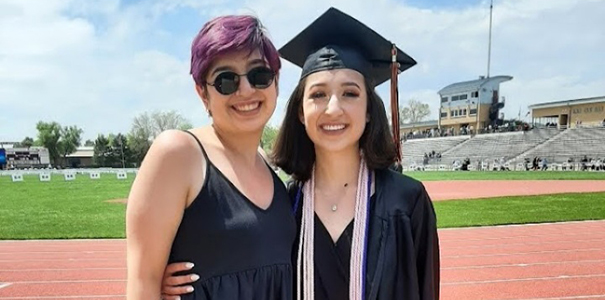
Living and growing up with someone for 18 years creates a deep, strong connection, and for siblings Alex and Charlie Archuleta their bond is now even more amplified as they’re forging a new path in their family together.
“One of the quotes that I always have engraved in my mind from our mom is that paper makes paper,” Alex said.
Alex is a freshman studying early childhood education. Her sibling, Charlie, is a sophomore majoring in Musical Education at UNC, so it was Charlie who entered the college world first.
“It was never ‘if’ I was going to go to college, it was more of a ‘when,’” Charlie said.
The pair credit their determination to succeed in higher education to their parents who weren’t able to graduate themselves.
“Our mom wanted to finish but there were some family circumstances that prevented her, so she definitely wanted us to have better,” Alex said.
That makes both Alex and Charlie first-generation students at UNC, a term they are both proud to claim.
“I know the circumstances haven’t been the kindest to my family in that regard, so I’m just really happy to be here. I’m always excited to learn whatever I can and to do that in a higher education setting is really exciting to me,” Charlie said.
Both of the siblings chose UNC for its diverse education programs, and with each passing test and paper turned in they know the impact their achievements have on their family.
“We talk to our parents all the time, and the other day our mom just started crying. I said, ‘mom are you OK’ and she said, ‘I am just so proud of you two,’” Alex said. “We appreciate that so much, so to say the least she’s very proud of us.”
Meet More First-Generation Pioneers
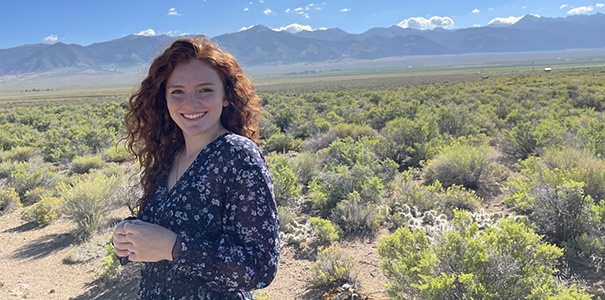
Olinda Moro López
Senior, Psychology
Why did you choose to go to UNC?
- I chose UNC for a variety of reasons but the biggest one is because before I was admitted into the University, I was already receiving incredibly personalized support in regards to how to navigate college, who I should be in contact with, what classes I needed to take my first semester and how to go about arranging my schedules so that I finished in a timely and smart manner.
What does it mean to be a first-generation college student?
- Being a first-generation student means that I am setting a curve, it means working twice as hard for things that have been gifted to others, it means never giving up no matter how tempting it may be. But being a first-generation student goes beyond the school, it means that I physically represent my families hopes and aspirations. I am breaking obstacles that my family never had the opportunity to break. Being first generation is a source of pride and it shows that I have fought and earned my place at that graduation ceremony. At first, first-generation is an obstacle, but there comes a moment where suddenly being first generation becomes a step into something bigger and better. First generation means that you build your own bridges from nothing, and you leave them up in hopes that it may help someone else cross.
What is your professional goal after higher education?
- My goal right now is to go to graduate school and receive a master’s degree in Clinical Mental Health Counseling. After that, I plan on opening my own private practice and treating Hispanic/Latin families of children who have been abused/neglected.
What has been most helpful to you since coming to UNC?
- The most helpful thing to me since coming to UNC has been the academic support that can be found no matter who you talk to. And not only that but the willingness from professors to connect and go beyond the classroom. It is a small community but a very supportive one and that has truly created such a difference in my life.
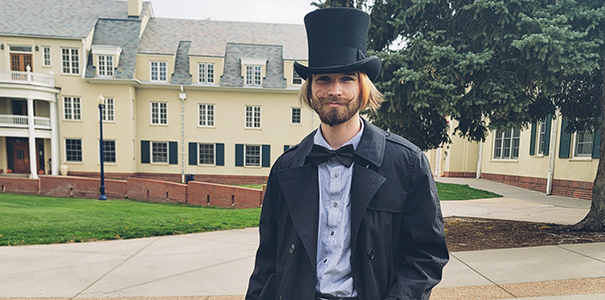
Brecken Lusk
Freshman, Physics
Why did you choose to go to UNC?
- I chose UNC due to its location, programs, and scholarships.
What does it mean to be a first-generation college student?
- As a first-generation college student I do not know what I am doing in college and the best my family can do is cheer me on as they also have no experience. It is an interesting adventure.
What has been most helpful to you since coming to UNC?
- The most helpful program for me was Lead On, which introduced me to college life, allowed me to meet faculty, and gave an understanding of the campus that seems to surpass many upper classmen I have since met.

Adriana Garcia
Junior, Nursing
Why did you choose to go to UNC?
- One of the main reasons I chose to come to UNC is because it is a very diverse school. I went to a high school that was 95% minority and as a first-generation Latina, I wanted to go to a school where I could relate to others and feel accepted. After visiting UNC during my senior year of high school, I knew that this was the place for me.
What does it mean to be a first-generation college student?
- Being a first-generation college student to me means succeeding against all odds. In high school, I often found myself wondering whether going to college was feasible for me. No one in my family had made it to college so at times I was lost and scared that I wouldn’t be able to do it. But I put in a lot of hard work and was lucky enough to have the support that I did, and I made my dream of going to college possible despite all the barriers that were in my way.
What is your professional goal after higher education?
- I chose the nursing profession because I like to help people. Although I’m still not sure where exactly I want to be in nursing, I know that I want to be an advocate and work towards resolving disparities that underserved communities face in healthcare.
What has been most helpful to you since coming to UNC?
- The Reisher Scholars Program has made the biggest impact on my college journey thus far. Not only have they provided me with financial support, but I have become a part of a community of other inspirational students who have provided for me a lot of encouragement, motivation and overall emotional support these last couple of years.
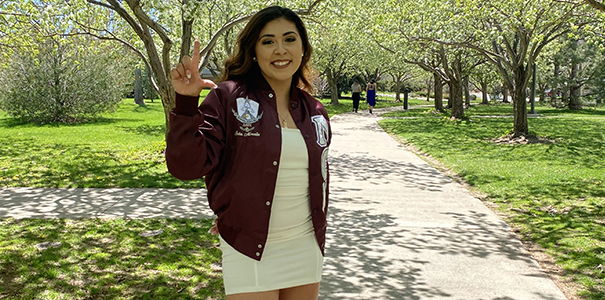
Alisae Morales
Senior, Human Services
Why did you choose to go to UNC?
- I choose UNC because it offered me the most support and was close to my family.
What does it mean to be a first-generation college student?
- Being first-generation means taking the risk to be THE FIRST. It means fighting impostor syndrome every single time we walk into a classroom. To be first gen, is not easy by any means but we show up every single day because WE BELONG.
What is your professional goal after higher education?
- My goal is to obtain my master’s in Public Health and become a director in a hospital for health and wellness, educating providers on how to better support and assist Black, Indigenous, People of Color communities
What has been most helpful to you since coming to UNC?
- Since coming to UNC, the CHE TRiO program has had the greatest impact on me. It is a special program that helps assist first-generation students trying to navigate college. They have supported and guided me every step of the way. Both my advisors from CHE, Seferino and Germany, are the reason I am still here today and will be receiving my bachelor’s this fall.

Maria Serna
Junior, Biology
Why did you choose to go to UNC?
- I decided to go to UNC because I grew up in Greeley and every time I passed the campus I knew this was the school for me.
What does it mean to be a first-generation college student?
- Being a first-generation college student in a bigger family means more than I could possibly put into words. For me it is a step closer to bringing my family out of poverty and showing my siblings that higher education is important.
What is your professional goal after higher education?
- Ideally when I am older, I hope to work for a low-income clinic as a physician. Giving back to the community that gave to me when I was struggling would be a dream of mine.
What has been most helpful to you since coming to UNC?
- Since coming to UNC the most helpful things have been my advisors in CHE and Sherri from Reisher. Without these important people I would not be in the position to graduate a semester early. They have guided me through the tough times and celebrated with me through the great times.
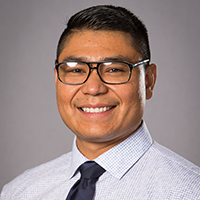
Rudy Vargas ’13
Current graduate student at Colorado School of Public Health at UNC, interim co-director César Chávez Cultural Center and Undocumented Student Services
What motivated you to be the first in your family to complete college?
- My parents had sacrificed all they had to move to the United States from Coahuila, Mexico, and they always encouraged me to get educated. Additionally, growing up as an immigrant in the US, there were so many barriers and so much information I didn’t know, so I wanted to grow up and “be the person I needed when I was younger” to help ease the feeling of uncertainty among those who looked like me. These two reasons combined gave me the motivation and resilience to attend college, and then to pursue my master’s in Public Health.
What did it mean to you to be a first-generation student?
- It was difficult to navigate systems that were so unfamiliar to me, as I often missed out on opportunities because of my lack knowledge regarding resources available. Additionally, I often doubted myself because of impostor syndrome, since I always assumed I was the only one feeling lost. However, all the positive and negative experiences I had, allow me to better understand the needs of first-generation students, and it helped make my younger brother’s experience at UNC easier. Additionally, this experience has also allowed me to better support the students I work with at the moment through the César Chávez Cultural Center and the DREAMer Engagement Program.
Advice for other first-generation students?
- You are not alone! Many of us are first-generation students and can help you navigate college. Additionally, there are many offices and organizations on campus who can provide more guidance and resources that will help improve your experience as a first-generation student. Also, find yourself a mentor who can guide you and support you through your academic journey. I am grateful that I was connected to mentors such as Dr. Aldo Romero, director of the Cumbres Program, and Dr. Tobias Guzmán, UNC’s vice president for Diversity, Equity and Inclusion.

Lyndsey Crum, ‘05
Assistant vice president for Alumni Relations and interim assistant vice president for Marketing and Communications
What motivated you to be the first in your family to complete college?
- I always wanted to go to college and was fortunate that my mother and grandparents always affirmed my interest. And once I started, there was no question in my mind that I would do whatever it took to finish. I am immensely proud of being the first person in my family to earn a college degree and I am grateful for those who encouraged me along the way toward graduation.
What did it mean to you to be a first-generation student?
- First generation isn’t a label that I knew as a college student. I didn’t know that other folks shared the same experiences, questions or challenges that I faced. I think it helped that I chose UNC, as did many students from my high school. So, while I was the first in my family to go to college, I was not the first in my social circle and I knew that I was not alone. I think that also helped my family have a sense of comfort about what I would experience and go through as a college student. Knowing that someone has done it before is huge encouragement to doing it yourself. And UNC provided me that support and encouragement, so much so that my status as a first-generation student was nearly nonexistent.
Advice for other first-generation students?
- Don’t be afraid to ask what something means or how to do something. I was nervous about asking questions and felt insecure because I didn’t even know what questions to ask. That insecurity can be paralyzing and a barrier to your success if you don’t find a way to overcome fear. It turns out that a lot of folks have the same questions — how to get a job on campus, how to fill out FAFSA, scholarships, registration etc. Don’t worry, there are answers and support, so never be scared to ask the question. Always advocate for yourself and ask for what you need to succeed.
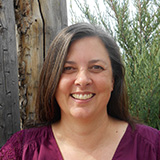
Susan Keenan
Professor, School of Biological Sciences
What motivated you to be the first in your family to complete college?
- I was a non-traditional student and didn’t attend college until I was in my mid-twenties. I wasn’t happy with the jobs I had and decided to give college a try with the encouragement of a professor that I met through friends.
What did it mean to you to be a first-generation student?
- Honestly, I did not hear the term first-generation until I was a professor, so I didn’t know that I was a first-generation student. As a student, I often found college life confusing and challenging. I think it’s great that we are trying to make higher education more welcoming for first-generation students; it’s vital that we identify institutional barriers that might impact their success and provide support throughout their programs.
Advice for other first-generation students?
- You do belong. It’s normal to struggle in college—everyone does at one time or another. Find your group, the folks who support you and reach out for help. And, office hours are for you—come with your questions about the class and about being a college student.
UNC’s Resources for First-Generation Students
- UNC’s Center for Human Enrichment Student Support Services (CHE) program provides comprehensive academic services to support the academic, professional and personal success of UNC’s first-generation students. The program serves approximately 200 students, accepting 60-70 new students each year, who identify as first-generation students and meet federal income guidelines set by the U.S. Department of Education. The program focuses on facilitating the successful academic retention and graduation of first-generation college students.
- Bears First is a program designed to help establish a strong first year of academic success by providing personalized coaching and advising, facilitating the development of individual academic success plans and formalized connections to campus resources and supports. Participants are identified through the Office of Admissions and many of the students are first-generation.
- The Stryker Institute for Leadership Development serves women from underrepresented groups; approximately 90% of the students who participate identify as first-generation students. The Stryker program provides a full tuition financial scholarship that can help alleviate the financial barriers that many first-generation students are navigating. The program also offers the opportunity for scholars to attend workshops that focus on identity development, social justice, leadership and mentorship. Through the workshop experience and cohort model, scholars are able to build a strong sense of community and support. Students interested in applying for the scholarship can learn more on the Stryker Institute’s website.
- Learning Through Engaging and Authentic Practices (LEAP) Scholars are first-generation biology or chemistry majors who aspire to become medical professionals. Since 2015, the LEAP Scholars program has supported over 80 students, many of whom identify as students of color or are Pell grant recipients, in addition to being among the first in their families to attend college. The program employs many high-impact practices that positively impact student success and offers academic and social support through a small network of advisors, faculty and near-peer mentors.
- UNC’s First Generation Scholarship is awarded to first-generation students demonstrating financial need. Completion of the UNC Scholarship Application is the only requirement to be considered for this scholarship, the deadline to apply is Feb. 1, 2022. Through generous donor support, UNC has awarded 162 students over $158,000 in the UNC First Generation scholarship since 2017-18. During that time, 491 individuals have donated to the First Generation scholarship. Learn more about other UNC donor-based scholarships.
- UNC’s Ronald E. McNair Post-baccalaureate Achievement Program is a federally funded undergraduate program serving first-generation, low-income and underrepresented students. It is designed to provide undergraduate students with effective preparation for graduate-level study through research and scholarly activities, summer internships, seminars and workshops, mentoring, and assistance with graduate school admission processes.
- The Reisher Scholars Program awards scholarships to Colorado students based upon demonstrated financial need and academic merit. The program, which focuses on rising college sophomores and transfer students from community colleges, seeks to help promising Colorado students earn their undergraduate degrees without incurring additional educational debt. It continues to accomplish higher GPAs as well as higher retention and graduation rates than the general student population. This includes no achievement gaps for first-generation and underrepresented minority students.



